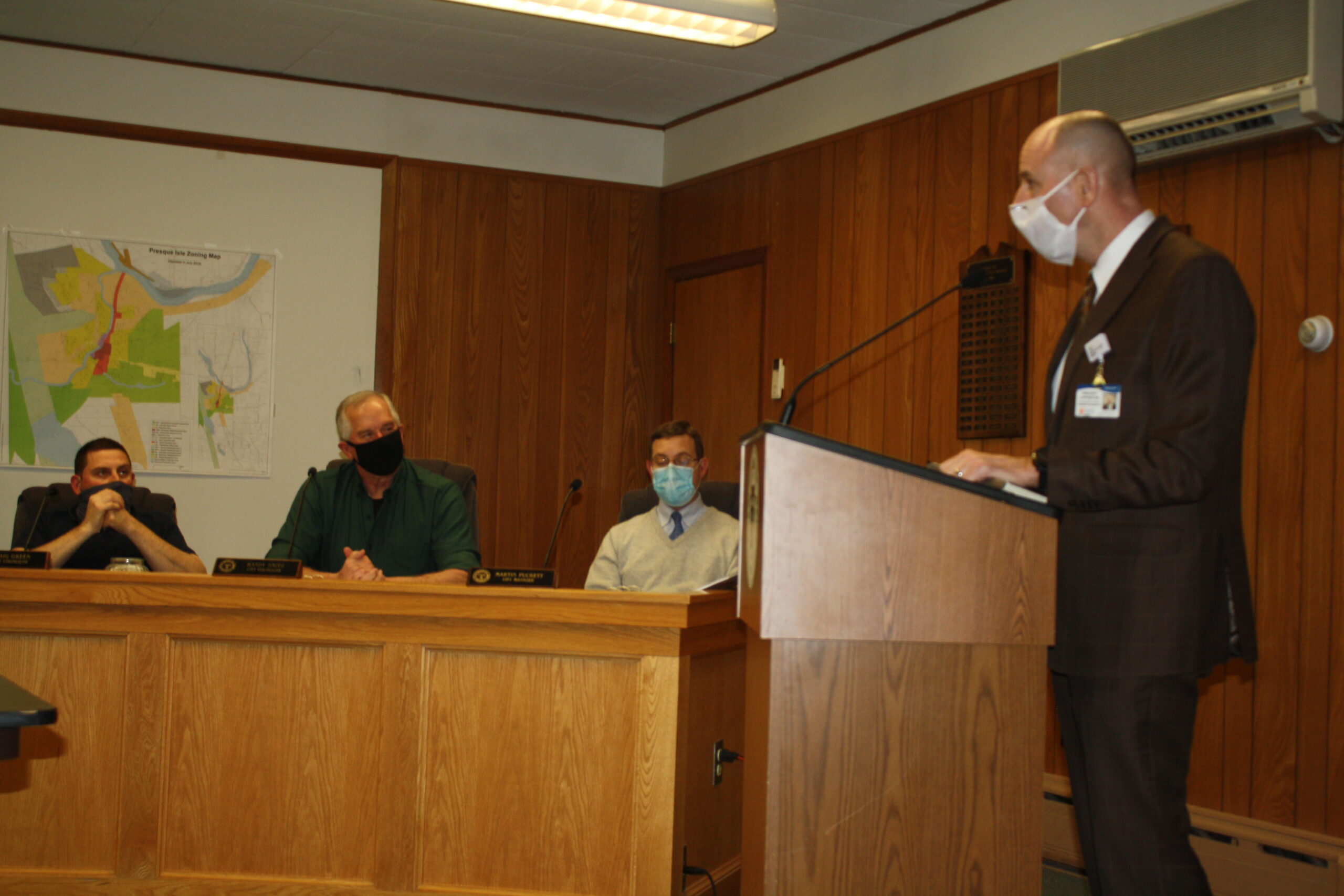
PRESQUE ISLE, Maine — The Presque Isle City Council approved department budgets that unexpectedly spent more than their budget shares in 2020 and learned more about the local hospital’s COVID-19 vaccination efforts during its regular meeting on Wednesday, Feb. 3.
City manager Martin Puckett explained to the council that five city departments — the fire department, public safety building, utilities, debt service and information technology — overspent their designated 2020 budgets as a result of unanticipated expenses that arose throughout the year.
The fire department spent $29,616, in addition to their allotted $1.5 million, on equipment purchases and repair and overtime work hours due to additional EMS they provided to surrounding communities. The towns of Mars Hill, Blaine and Bridgewater relied on Presque Isle ambulance services until their own Central Aroostook Ambulance Service got underway last September.
Both the city’s public safety building and information technology departments spent funds in addition to their budgets — $14,461 and $4,800, respectively — due to the costs of unexpected maintenance and computer system upgrades. The public safety building had been approved for $327,498 while information technology was approved for $66,385.
The utilities department spent $3,445 in addition to its $608,058 budget after traffic accidents in Presque Isle resulted in necessary repairs to traffic lights. The city’s debt service included an additional $3,653 to the initial $87,200 due to the city’s tax anticipation note being higher than expected. A tax anticipation note allows the city to finance capital projects prior to collecting tax revenue.
The numbers for the overspent budgets are preliminary and have yet to be audited, but still require the council’s approval, Puckett said. Even with the unexpected overages in the five departments, the city’s overall expenses for 2020 were $671,082 below budget and revenues were $209,400 above budget, allowing the city to end the year $880,482 below budget.
The council unanimously approved the overspent budgets, with most of the brief discussion highlighting the city’s high revenues and low expenses for that budget year.
During the citizen comments portion of the public meeting, Greg LaFrancois, president of Northern Light AR Gould hospital, spoke to the council about the hospital’s latest vaccination efforts.
Just a week before the council meeting, AR Gould had vaccinated more than 2,000 people ages 70 and older as part of three daylong vaccination clinics held at Northern Maine Community College. LaFrancois noted that AR Gould will be informed every Monday morning on how much vaccine they will receive from the Maine CDC and announce clinic dates and times at 2 p.m. the same day. They plan to designate Wednesday and Friday as clinic days.
Due to limited federal supplies of vaccines, AR Gould expects to only receive perhaps 1,000 doses every week, which LaFrancois said means that it could take 17 weeks to vaccinate the 17,000 people aged 70 and older within Presque Isle and surrounding communities that the hospital estimates are eligible for the current round of vaccinations.
The hospital added a day to their first week of clinics after receiving more allotments of the Pfizer vaccine than anticipated. In the future they expect to receive doses of Pfizer and Moderna vaccines.
Councilor Mike Chasse asked LaFrancois about the state’s next phase of vaccinations, which will include people with pre-existing conditions who are often more vulnerable to COVID-19.
“How will you determine what conditions make someone vulnerable?” Chasse asked.
LaFrancois said that that task will be challenging for the hospital, since the governor’s office has not yet clarified which particular pre-existing conditions will move certain people up the line in the vaccination process.
“Once we do know, we can identify which patients [from AR Gould] have those conditions, based on their medical records, and start calling them,” LaFrancois said.
Though LaFrancois and his staff cannot control how much vaccine dosage the hospital receives weekly, he noted that they are having conversations with the Maine CDC about whether NMCC can become a mass vaccination site, which would allow 2,000 people to be vaccinated per day. Currently Maine has two mass vaccination sites — the Cross Insurance Center in Bangor and Scarborough Downs — and is developing another at a Sanford shopping center.
To make NMCC a mass vaccination site, LaFrancois said, AR Gould would have to show that the region has a large enough population to support such an endeavor and not risk wasting vaccine dosage, LaFrancois said.
“There’s a lot of red tape involved with this process,” LaFrancois said. “But one thing we can say is we have not wasted a single dose of vaccine. We would love to get our 70 and older population vaccinated sooner so that we can move on to other populations.”






